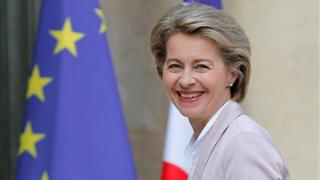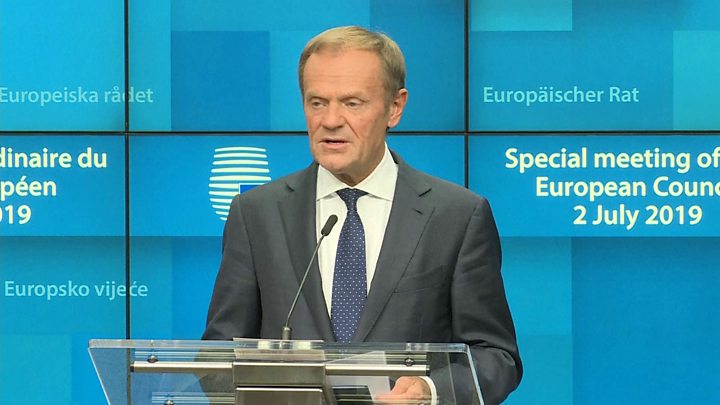Germany’s Ursula von der Leyen nominated to lead EU Commission
 Image copyright Reuters
Image copyright Reuters EU leaders have put forward their nominations for the bloc’s top jobs, with a woman for the first time proposed for European Commission chief.
The surprise choice of German Defence Minister Ursula von der Leyen to replace Jean-Claude Juncker came after the main front-runners were rejected.
IMF head Christine Lagarde has been nominated for the head of the European Central Bank (ECB).
The announcement follows days of difficult negotiations.
In all, EU leaders were tasked with nominating five people for the top jobs.
Belgian liberal Prime Minister Charles Michel is nominated to replace European Council President Donald Tusk while Spain’s Josep Borrell is proposed as foreign policy chief.
The ECB role is currently filled by Mario Draghi, who was widely credited with saving the euro during the eurozone debt crisis.

Media playback is unsupported on your device
Ms Lagarde said she was “very honoured” to have been nominated, tweeting that she had “decided to temporarily relinquish my responsibilities as IMF Managing Director during the nomination period”.
Their nominations must be approved by the European parliament.
‘Perfect gender balance’
“We have agreed the whole package before the first session of the European Parliament,” said Mr Tusk.
He praised the “perfect gender balance” and said Germany had abstained on Ms von der Leyen’s nomination over coalition issues. However, he pointed out that Mrs Merkel herself had backed her.
The German leader told reporters that her abstention had come according to a deal reached in the ruling coalition in Berlin.
“We agreed this in the coalition: that if there is no unanimity, then one abstains. But one can say this has been approved today without any opposition,” she said.
If Ms von der Leyen is confirmed in the role it would be the first time in more than 60 years that a German has been given the post.
Nominees for the top jobs
Ursula von der Leyen – European Commission president
Born in Brussels, Ms von der Leyen’s family moved to Germany when she was 13. She studied economics at London’s LSE and medicine in Hanover before going into politics.
She has been a member of Mrs Merkel’s conservative Christian Democrats (CDU) since 2005.
Christine Lagarde – head of the European Central Bank
Ms Lagarde, 63, who is French, was the first woman to head the International Monetary Fund (IMF) when she took the job in 2011.
She studied in the US before graduating from law school in Paris and obtaining a Masters degree from the Political Science Institute in Aix en Provence
She was appointed France’s trade minister in 2005 and finance minister in 2007.
Charles Michel – European Council president
Mr Michel, 43, is a lawyer and a former mayor of the Belgian city of Jodoigne. He has been a European Commissioner and a member of the European Parliament.
In October 2014 at the age of 38 he became Belgium’s youngest prime minister since 1841.
Josep Borrell – EU foreign policy chief
The 72-year-old Spanish foreign minister is set to make a return to the top tier of EU politics after serving as European Parliament president from 2004 to 2007.
He began his career as a member of the Spanish Socialist Party in 1975 and has a reputation for plain speaking.
If his nomination is approved he will take over the foreign policy brief from Italy’s Federica Mogherini.
The fifth key nomination – that of President of the European Parliament – is to be chosen on Wednesday.
Irish Prime Minister Leo Varadkar said the nomination of two women for key jobs sent a powerful message that the EU was leading the way towards gender equality.
However, there were concerns that the European Parliament’s own contest for the main job – the “Spitzenkandidaten” (lead candidate) process – had been cast aside. Neither the winner of that process, Manfred Weber of Germany, nor other frontrunners were selected by EU leaders.
“You have to compromise in politics,” Mr Varadkar insisted, adding that the centre-right Mr Weber would most likely be given the shared presidency of the European Parliament along with a Socialist figure.
There was also surprise that four of the main jobs had gone to Western Europeans, with no nominations from Eastern Europe.
However, the eastern states are thought to have been strongly behind Ms Von der Leyen’s nomination, having rejected a compromise involving Dutch Labour leader Frans Timmermans the night before.




